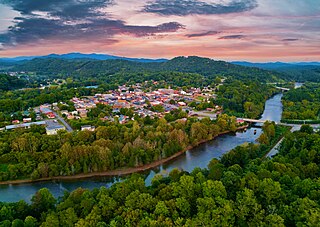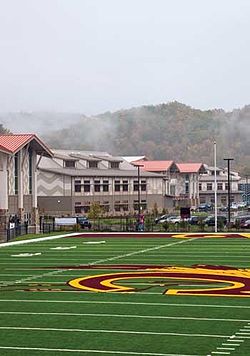
Swain County is a county located on the far western border of the U.S. state of North Carolina. As of the 2020 census, the population was 14,117. Its county seat is Bryson City.

Jackson County is a county located in the western part of the U.S. state of North Carolina. As of the 2020 census, the population was 43,109. Since 1913, its county seat has been Sylva, which replaced Webster.

Cherokee County is the westernmost county in the U.S. state of North Carolina. It borders Tennessee to its west and Georgia to its south. As of the 2020 census, the population was 28,774. The county seat is Murphy.

Murphy is a town in and the county seat of Cherokee County, North Carolina, United States. It is situated at the confluence of the Hiwassee and Valley rivers. It is the westernmost county seat in the state of North Carolina, approximately 360 miles (580 km) from the state capital in Raleigh. The population of Murphy was 1,608 at the 2020 census.

Gaffney is a city in and the seat of Cherokee County, South Carolina, United States, in the Upstate region of South Carolina. Gaffney is known as the "Peach Capital of South Carolina". The population was 12,539 at the 2010 census, with an estimated population of 12,609 in 2019. It is the principal city of the Gaffney, South Carolina, Micropolitan Statistical Area, which includes all of Cherokee County and which is further included in the greater Greenville-Spartanburg-Anderson, South Carolina Combined Statistical Area.

Western Carolina University (WCU) is a public university in Cullowhee, North Carolina. It is part of the University of North Carolina system.

Kermit Houston Hunter was an American playwright known primarily for writing historical outdoor dramas. His many works include two dramas for Cherokee tribes, one for the Eastern Band of Cherokee Indians in North Carolina and one written for the larger Cherokee Nation of Oklahoma.

Cherokee is a census-designated place (CDP) in Swain and Jackson counties in Western North Carolina, United States, within the Qualla Boundary land trust. Cherokee is located in the Oconaluftee River Valley around the intersection of U.S. Routes 19 and 441. As of the 2020 census, the CDP had a population of 2,195. It is the capital of the federally recognized Eastern Band of Cherokee Indians, one of three recognized Cherokee tribes and the only one in North Carolina.

The Qualla Boundary or The Qualla is territory held as a land trust by the United States government for the federally recognized Eastern Band of Cherokee Indians (EBCI), who reside in western North Carolina. The area is part of the large historic Cherokee territory in the Southeast, which extended into eastern Tennessee, western South Carolina, northern Georgia and Alabama. Currently, the largest contiguous portion of the Qualla lies in Haywood, Swain, and Jackson counties and is centered on the community of Cherokee, which serves as the tribal capital of the Eastern Band of Cherokee Indians. Smaller, non-contiguous parcels also lie in Graham and Cherokee counties, near the communities of Snowbird and Murphy, respectively.
The Lumbee are a Native American people primarily centered in Robeson, Hoke, Cumberland, and Scotland counties in North Carolina.
The Eastern Band of Cherokee Indians (EBCI), is a federally recognized Indian tribe based in western North Carolina in the United States. They are descended from the small group of 800–1,000 Cherokee who remained in the Eastern United States after the U.S. military, under the Indian Removal Act, moved the other 15,000 Cherokee to west of the Mississippi River in the late 1830s, to Indian Territory. Those Cherokee remaining in the east were to give up tribal Cherokee citizenship and to assimilate. They became U.S. citizens.
Joyce Dugan is an American educator, school administrator, and politician; she served as the 24th Principal Chief of the federally recognized Eastern Band of Cherokee Indians (1995-1999), based in Western North Carolina. She was the first woman to be elected to this office, and as of 2024 the only one.

Chilocco Indian School was an agricultural school for Native Americans on reserved land in north-central Oklahoma from 1884 to 1980. It was approximately 20 miles north of Ponca City, Oklahoma and seven miles north of Newkirk, Oklahoma, near the Kansas border. The name "Chilocco" is apparently derived from the Creek tci lako, which literally meant "big deer" but typically referred to a horse.

Cherokee Central Schools is a school district in Cherokee, North Carolina, consisting of a single campus holding buildings serving grades K-12 and the administration office. The schools are a K-5 elementary school, a 6-8 middle school, and a 9-12 high school. The Ravensford Campus, the academic campus, occupies much of the historic Ravensford archaeological site. In 1987–88, the elementary school was recognized as a Blue Ribbon School.

Cherokee Preservation Foundation is an independent nonprofit foundation established in 2000 as part of the Tribal-State Compact amendment between the Eastern Band of Cherokee Indians (EBCI) and the State of North Carolina. The Foundation is funded by the EBCI from gaming revenues generated by the Tribe; it is not associated with any for-profit gaming entity and is a separately functioning organization independent of the Tribal government. It works to improve the quality of life of the EBCI and strengthen the western North Carolina region by balancing Cherokee ways with the pursuit of new opportunities.
Swain County High School is a public high school located in Bryson City, North Carolina. Swain County High School is a part of the Swain County School System. It is the only 9–12 high school in the county.

Cherokee County Schools manages the 13 public schools in Cherokee County, North Carolina, United States, with an enrollment of 3,081 students and a 12.7:1 student-to-teacher ratio.
The Eastern Band of Cherokee Indians educational policies have shaped the scholastic opportunities afforded to its members. The decision of the Eastern Band of Cherokee Indians (EBCI) to take control of the schools located on the Qualla Boundary under the Tribally Controlled Schools Act of 1987 started a wave of tribal responsibility in education. EBCI Tribal Council began producing programs that aided its members in most all aspects of the educational process. The evolution of these programs, their financing, and their relationship with tribal members and non-members alike are in a constant state of flux dependent upon policies produced by the EBCI tribal council. The EBCI tribal council does not directory set educational policy, although some if its members do set on boards that govern the educational facilities, and in most cases the director of the educational programs do report to the tribal council throughout the year. The policies of the EBCI educational programs can be analyzed through their respective goals, objectives, and procedures.

Richard G. Sneed is the 28th Principal Chief of the Eastern Band of Cherokee Indians. Sneed succeeded former Principal Chief Patrick Lambert following Lambert's impeachment, only the second such impeachment since the 19th century.
The New Kituwah Academy, also known as the Atse Kituwah Academy, is a private bilingual Cherokee- and English-language immersion school for Cherokee students in kindergarten through sixth grade, located in Cherokee, North Carolina, in the Yellow Hill community of the Qualla Boundary. It is owned by the Eastern Band of Cherokee Indians (EBCI), and operated by the Kituwah Preservation and Education Program (KPEP).















